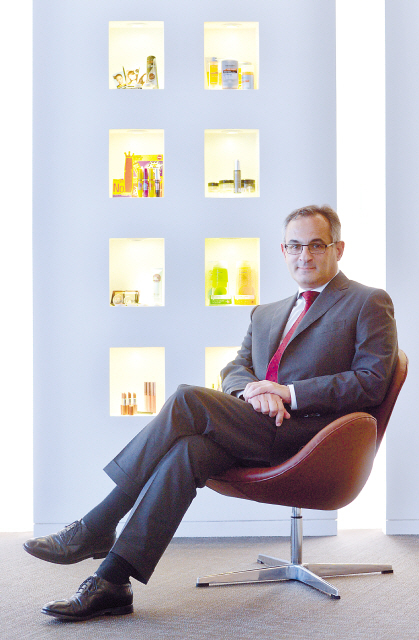Head of Korean unit talks about the ‘never-ending growth story’ of beauty and cosmetics industry
About 33 years ago, the current head of L’Oreal Korea, Richard Cymberg, made a choice that had lasting repercussions on his career path.
The French man graduated from ESLSCA with a degree in marketing, and received two offers ― one from IBM and one from Diparco, a former subsidiary of the L’Oreal Group.
But for Cymberg, the choice was easy.
“It was so evident (for) me to enter the beauty market … from the beginning I thought (it) would be a never-ending growth story,” he told The Korea Herald.
Cymberg currently serves as the president and executive director of the Korean branch of the L’Oreal Group, one of the world’s leading beauty and cosmetics companies founded over 100 years ago in France.
Brands in its portfolio include high-end cosmetic lines such as Lancome, hair product lines like Kerastase Paris, as well as an “active cosmetics” line sold in pharmacies and drugstores and a “consumer products” line that includes the well-known and beloved mascara maker Maybelline New York.
The current Korean branch was formally established in 1993 and operates around 14 out of 27 of L’Oreal’s global brands, according to the company’s media kit.
“Every division contributes to the overall development of the company in Korea. And my job is to make them grow,” Cymberg said.
The Korean beauty and cosmetics market is unique in that 64 percent of the market is in just two categories ― skincare and makeup, according to the French makeup executive.
“The facial skincare, the makeup, plus the night routine … (means) that (Korean women use) around 17 products (daily), which is absolutely amazing compared to every other country in the world,” he said.
 |
Richard Cymberg (Lee Sang-sub/The Korea Herald) |
Skincare also occupies about 49 percent of the Korean market, so the average Korean woman prizes flawless skin, according to him.
As far as makeup is concerned, Cymberg said that a particular trait he’s noticed among Korean consumers is their penchant for valuing a product’s promised effects, over a color’s vividness.
“When you talk about eye shadows, you see very pale … for example the nude according to the skin complexion, but not very striking colors,” Cymberg said.
Bold, dramatic lipstick is also something he hasn’t often seen during his tenure in Korea, so the only area of the body Korean women are fond of using colors are on nails, he said with a grin.
But beauty is more than just skin deep, according to Cymberg, who has worked in several branches of the L’Oreal Group, such as Brazil and France, before stepping up to head the Korean division in February 2010.
The L’Oreal Group operates research as well as assessment centers in several countries around the world, including Korea, and develops unique formulas and patents every year for items ranging from perfume to skincare products and more.
These “global” formulas are slightly tweaked to accommodate to local consumers’ needs, he said.
“You cannot develop one product for Asia, because if you take for example South Asia, the needs are totally different (from customers in East Asia), especially due to climate,” he said.
Cymberg also said that Korean consumers tend to be “experts” compared to those in other markets.
In Korea, consumers canvass blogs to exchange product information with each other, and even at makeup counters, for example, they are always testing out products for the “famous chok-chok” or “moisturizing” factor, Cymberg said.
This results in an extremely sophisticated market, with expert consumers that “have a huge and wide knowledge about cosmetics,” according to the French cosmetics executive.
Cymberg said he often visits distribution channels where many of the L’Oreal Group’s products are sold, such as pharmacies and department stores.
And he is always blown away by customers’ expertise, because “they know what they (are) talking about,” he said.
The Korean cosmetics and beauty market is also a trendsetter, so it’s true that many of the world’s leading makeup companies sometimes use Korea as a “test bed” to launch new products for the world market, according to the French makeup executive.
But there’s no beauty without substance, and the secret of L’Oreal’s success lies in its strong science-driven, research-based background that delivers proven results, time after time, Cymberg said.
This proven track record helps negate the claim that beauty is “superficial,” he said.
“We really think that beauty is a business of research and development. Without this, no product can be developed,” the French cosmetics executive said.
The company’s local division made 355 billion won in sales last year.
By Renee Park (
renee@heraldcorp.com)






![[Herald Interview] 'Trump will use tariffs as first line of defense for American manufacturing'](http://res.heraldm.com/phpwas/restmb_idxmake.php?idx=644&simg=/content/image/2024/11/26/20241126050017_0.jpg)
![[Exclusive] Hyundai Mobis eyes closer ties with BYD](http://res.heraldm.com/phpwas/restmb_idxmake.php?idx=644&simg=/content/image/2024/11/25/20241125050044_0.jpg)
